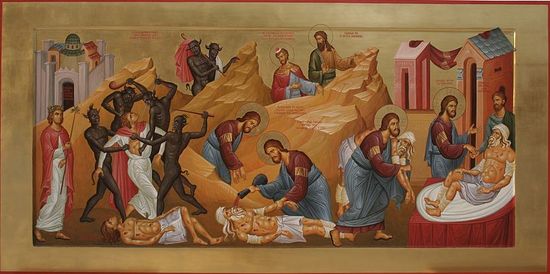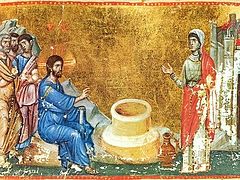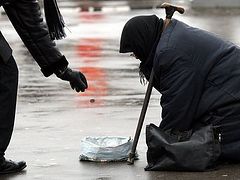SOURCE: Pravmir.ru
And behold, a certain lawyer stood up, and tempted Him, saying, Master, what shall I do to inherit eternal life? He said unto him, What is written in the law? how readest thou? And he answering said, Thou shalt love the Lord thy God will all thy heart, and with all thy soul, and with all thy strength, and with all thy mind; and thy neighbour as thyself. And He said unto him, Thou hast answered right: this do, and thou shalt live. But he, willing to justify himself, said unto Jesus, And who is my neighbour? And Jesus answering said, A certain man went down from Jerusalem to Jericho, and fell among thieves, which stripped him of his raiment, and wounded him, and departed, leaving him half dead. And by chance there came down a certain priest that way: and when he saw him, he passed by on the other side. And likewise a Levite, when he was at the place, came and looked on him, and passed by on the other side. And a certain Samaritan, as he journeyed, came where he was and when he saw him, he had compassion on him, And went to him, and bound up his wounds, pouring in oil and wine, and set him on his own beast, and brought him to an inn, and took care of him. And on the morrow when he departed, he took out two pence, and gave them to the host, and said unto him, Take care of him; and whatsoever thou spendest more, when I come again, I will repay thee. Which of these three, thinkest thou, was neighbour unto him that fell among the thieves? And he said, He that shewed mercy on him. Then said Jesus unto him, Go, and do thou likewise (Luke 10:25-37).
In the Name of the Father, and of the Son, and of the Holy Spirit!
My dear friends! Now more than at any other time in my entire life – and I have lived no few years – I have had occasion to hear the question: “How should I live in order not to perish?” “How should I live in order to be saved?” ask the faithful.
“How should I live?” This is likewise asked by those whose notion of life does not extend beyond the coming day.
This question is asked by young people who are just starting out on life. It is likewise asked by older people who are already completing their earthly paths, at the end of which they have made the terrible discover that their lives have been lived out – yet not in the joy of creation, since all their labors and all their efforts have been sunk into the destruction and ruin that consumes all things.
Yes, the question of how to live is not an idle one. How consonant is the questioning of our contemporaries with the question once posed to the Prince of Life, Christ, by His contemporary – and not just by any contemporary, but by a guardian of the law given by God.
He asked: Master, what shall I do to inherit eternal life? And the words of the Lord that are pure words [cf. Psalms 11:7] sound forth in reply to the lawyer and with him to us, revealing the only true way to resolve all questions, confusion, and misunderstandings. We need always turn to the word of God, the Lord says. What is written in the law? how readest thou?
The law of God! It is given for all times and for all mankind. It is given in Divine Scripture; it is given in the law of conscience in every living thing; it is given in the laws of God-created nature.
Today we will not deny that we know this great law of the Lord, the law in which lies our earthly happiness and by which we will be raised to abide in blessedness with the Lord and all His saints for eternity.
Thou shalt love the Lord thy God with all thy heart, and with all thy soul, and with all thy mind… Thou shalt love thy neighbour as thyself. On these two commandments hang all the law and the prophets (Matthew 22:37, 39-40).
Yes, yes – we know this law and its requirements; we also know how to fulfill it in our lives. For who among us does not know what is good and desirable for us and what is bad, which we should strive to avoid by all possible means?
The Lord gave us a commandment: do not unto others as you would not have them do unto you. This commandment is also always with us, always before us, like a vigilant and impartial watchman who exposes and unmasks both our knowledge and our cunning. If the Lord compelled the lawyer in the Gospel to admit that he knows everything necessary for salvation, then we also cannot seek to justify ourselves by naïve questions, as if we had not known the path to salvation until the present day.
The law of God is one. Two commandments remain immutable for all time, so long as the world exists. These are the two anchors of life: love God with all your heart and all your soul; and love your neighbor as yourself.
We do not need to ask about love for God, since for us believers this seems self-explanatory. But our neighbors?
Who is my neighbor? Now it is not the lawyer who is questioning Christ and is being unmasked by the Lord. Rather it is we, my dear ones, who have become the disputers of this world, but not the doers of the clear and living word of God [cf. 1 Corinthians 1:20]. With our questions we cover over our cowardice, our spiritual laziness, our unwillingness to labor, and our reluctance to love. We forget this: For not the hearers of the law are just before God, but the doers of the law shall be justified (Romans 2:13).
We would likely not even ask the Lord the question: And who is my neighbour? For now, almost everywhere, everyone has become quite distant from us – even our blood relatives, parents, and those who have been cast aside by our inordinately swollen egos.
“I” and “mine” – this is our new law of life. According to this law, those closest to us – who gave us life, who have been wounded by their many burdens of labors, illnesses, and sorrows, and wounded by us ourselves – will await our help in vain. And yesterday’s friends will cease being loved ones as soon as they run into trouble or lose their ability to be useful to us in our holiday of life and pursuit of happiness.
Here we grant ourselves complete freedom to pronounce on everything and everyone. Thus, without realizing it, we discover that none of the loved ones around us is worthy of our love: one is a sinner and unworthy of love; another does not share our faith or convictions; and a third has fallen into a hole he himself has dug, meaning that he is worthy of punishment.
God’s commandment is broad and deep. But we, who judge haughtily, combine in ourselves the feelings of both the priest and the Levite who passed by the man in distress. We, too, pass by all who happen to be near, who need our attention, who ask for our help – not to mention those who simply suffer in silence next to us.
Here we are no longer doers of the law, but judges. And the question “How can I be saved” rings empty, for it has been trampled upon by our rejection of the God-given commandment to love our neighbors. We have no neighbors.
Have we heard today’s cautionary parable about the Good Samaritan, who had the law of love inscribed in his heart, for whom his neighbor was neither a neighbor in spirit, nor a neighbor by blood – but rather he whom he happened to meet on his life’s journey, who needed his help and love that very moment?
Have we heard the Lord’s rule for the lawyer and for us, who know the law: Go, and do thou likewise? Forget about yourself and your ego, and put that person who needs your help, whether material or spiritual, at the center of your life. Put whoever needs a neighbor at the center of your life, and become his neighbor.
That, my dear ones, is the measure of our spiritual maturity; that is where the answer to the question about our salvation lies. Go, and do thou likewise. You, too, go and do as the Lord teaches. You, too, go and do good to everyone who needs it, no matter what the person’s origins, no matter what his social position, no matter what. Go and do good, and you will fulfill the commandment of love.
Do good – do good from your heart, do good in God’s name to all your brethren in God; do good also to your enemies, do good to those who hate and wrong you – and then you will have fulfilled the commandment of love. And love for your neighbors will bring you closer to God, and you will fulfill Christ’s law and find salvation. Amen.
(Translated from the Russian)





